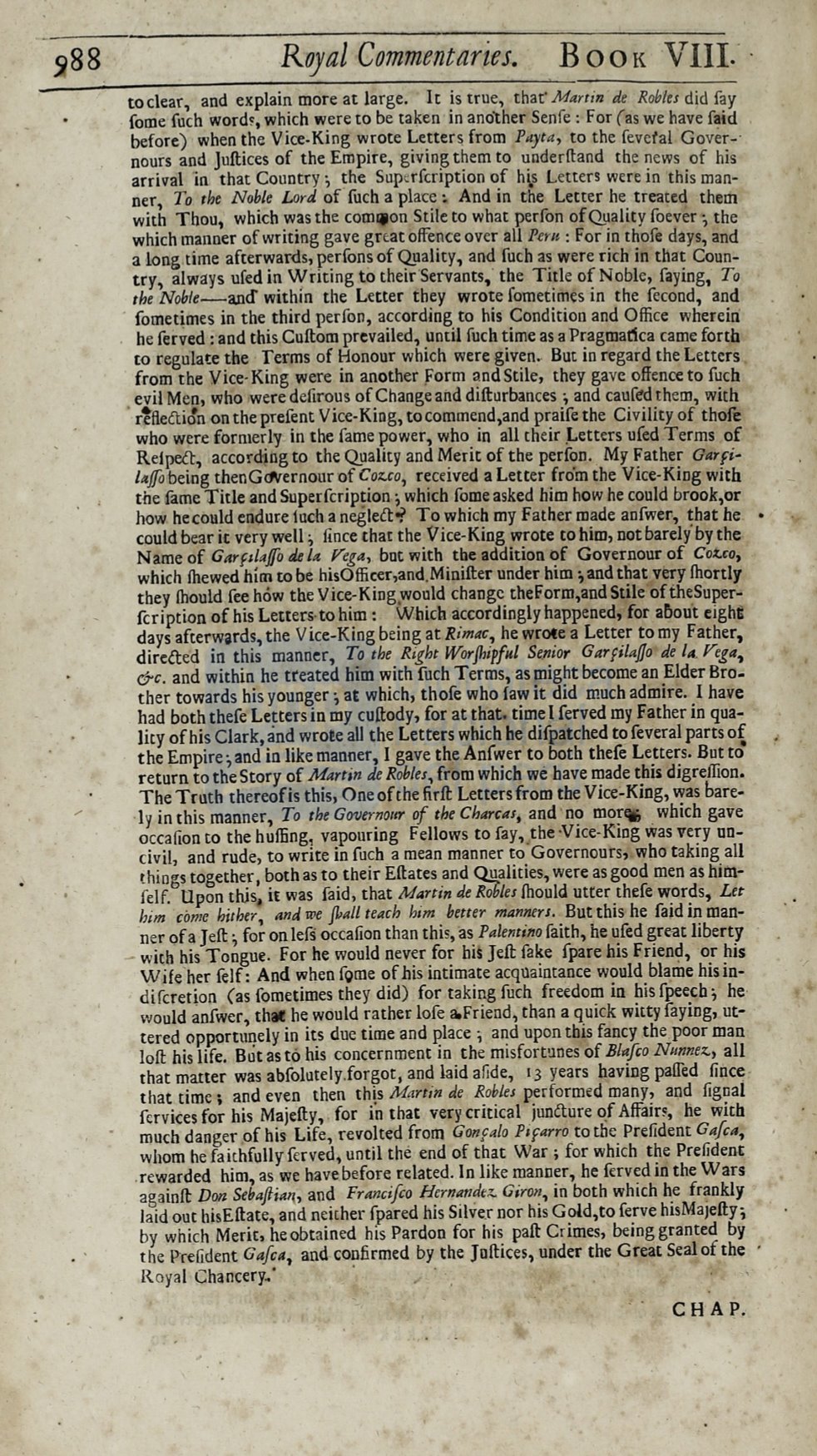

Royal Commentaries.
BooK
vn1.·
·
to clear, and explai~ more at large.
It
!S
true, thar
Martín ·de Robles
did fay
fome fuch word~, wh1ch were to be ta~en manolher Seníe: For
(
as we have faid
before) •when the Vice-King wrote Letter!\ from
Payta,
to the fevefal Govér-·
nours and Juftices of the Empire, giving them to underftand the news of his
arrival
fo,
that Country; ~he Superfcription of hls Letters were in this man~
ner,
To the
Noble Lord
of fucha pla'Ce
~
And in the Letter he treated them
with Thou, which was the
cotnr¡on
Stile to what perfon ofQuality foever ; the
which manner of writing gave gfeat otfence over all
iferu
:
For in thofe dáys, and
a ,long time afterwards, perfons of Quality, and fuch as were rich in that Coun–
try, always ufed in Writing
to
their'Servants," the Title of Noble, faying;
To
the
Noble-aná
whhin the Letter they wrote fometimes in the fe.cond, and
· fometimes in the third perfün, according to bis Condition and Office wherein
he fei:ved :and this Cuitoro prevailed, until fuch time as aPragmat'ka carne forth
e-o
liegulate the · rerms of Honour which were given.. Bue in regard the Lettcrs
from the Yice-King were in another form and Stile, they gave offence to fuco
. evil Men, who ,were defirnus of Change aild difturbances ; and caufed them, with
rÍfteétiJn on the prefent Vice-Kimg, tocommend,and praife the Civility of thofe
who were ft>rmerly in the fame power, who in all their .Letters ufed Terms of
Reipeéc, according to the Q
ualicyand Merit of the perfon..
My
Father
Garfi–
/4ffo
beiog thenGC,.,-ernour
-of
Coz.co,received a Letter fro"m the Vice-King wich
tbe fame Title and Superfcription ; which fome asked him how he could brook,or
how hecould emdulie íuch anegleét-? To which my Father made anfwer-, that he
could bear
i<t
very well; fince that the Vice-Kiog wrote to him, not barely'by the
N
ame of
Garfslaf/'o
de
la Vega,.
bnt with tbe additio11 of Governour of
Cozco,
which íhewed hím
to
be hisOflicer,and.Mioifter under him; and that
very
íhortly
they lliould fee
hów
the Vice-King,would changc theForm,and Stile oftheSuper–
fcription of his Letters-to him : Which accordingly happened, for ar,ou"t eighC
days afcerwards, the Vice-King being at
Rimac,
he
wrot:e
a Letter to my Father,
direéted in this manner,
To the Right Worjhipful Se_nior
Gar¡ilaflo
de la,
Vega,
&c.
and within he tt'eated him with fuch Terms, as might become an Elder Bro–
ther towards his younger; at which, thofe who faw it did much admire. I ha.ve
had both thefe Le~ters in
my
cuftody, for at that. time I ferved my
f
ather in qua–
lity ofhis Clark, and wrote ali the Letters which he difpatched to feveral parts of
the f.mpire; and in like manner, I gave the Anfwer to both thefe Letters. But tC:
return to the Story of
Martín de Robles,
from which wé have made
this
digreffion.
The Trnth thereofis this, Oneofthe firfi: Lettersfrom the Vice-King, was bare–
·ly
in this manner,
To the
Governo11r
of the Charcas,
and 'no
mor«lj
which gave
occafion to the huffing, vapouring Fellows to fay, _the ·Vice-King was very ua–
civil, and rude, to write in íucb a mean manner to Governours, w~o taking all
things togethe_r, ~oth as to_ their Eíl:ates _and QJ!alities, were as good menas hil'n–
felf.
Upon tlús,
lE
was fa1d, that
Marttn
de Robles
íhould utter thefe words,
Let
hi.m come hirher, and we foall teach him better manners.
But this he faid in man–
ner ofa Jeft ; for on
leís
occafion than this, as
P
alenti110
faith, he ufed'gre--at liberty
with bis Tongue. for he would never for bis Jeft fake fpare his Friend, or his
Wife'her felf: And when fome ofhis intimate acquaincance would blame bis in–
diícretion (as fometimes they did) for taking fuch freedom in bis fpeech; he·
would anfwer,
thae
he would rather lofe a.Friend, than a quick witty faying, ut–
tered opportul}ely in it_s due time and riace ; a~d upon tbis fancy the,poor man
loft bis life. Bue as tó hts concernment m che m1sfortunes of
Bl-afco
Nsmnez.,
ali
that marter was abfolutely.forgot, and laid aride,
13
years having pa{fed fince –
that time; and even then th\s
Martin de Robles
performed many, 31:Jd fignal
fcrvkes for his Majeíl:y, for in that very critica} junéture
~f
Atfair~, he with
much danger of his
Life,
revolted from
Gonfalo
Pi
farro
to the Prefident
Gafca,
whom he faichfully ferved, until thé end of that
War;
for which the Prelident
.rewarded him, as we havebefore related. ln like manner, he ferved in the Wars
againft
Dan
Sebaffi.an_,
and
Francifco Hcrnandtz., Giron,
in both which he frankly
laid out hisEítate, and. neither fpared hís Silve.r nor his Gold,to ferve hisMajeíty;
by which Merit, he obtained his Pardon for his pafl: Crimes, being granted by
the Preúdent
Gafaa,
and confirmed by the Jaftices, under the Great Seal of the
Royal Chancery1·
·
CHAi\














